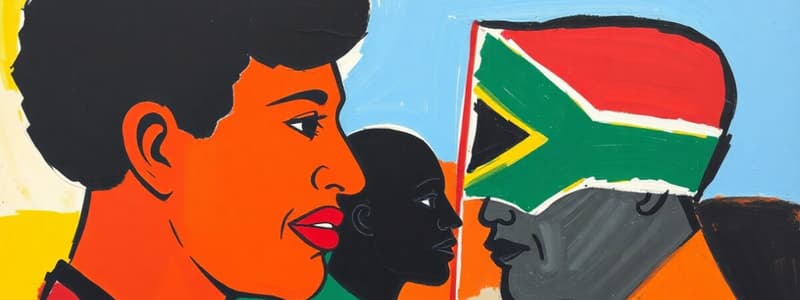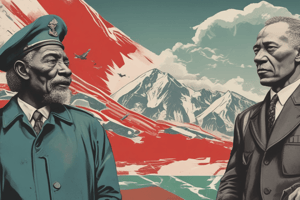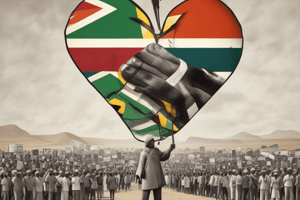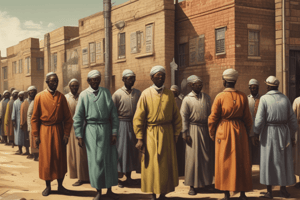Podcast
Questions and Answers
Which political organization emerged during the growing segregation in South Africa?
Which political organization emerged during the growing segregation in South Africa?
- The Southern African Party
- National Party
- African National Congress
- South African Native National Congress (correct)
Milner's task was solely focused on economic reconstruction of South Africa.
Milner's task was solely focused on economic reconstruction of South Africa.
False (B)
What significant political change took place in South Africa on May 31, 1910?
What significant political change took place in South Africa on May 31, 1910?
The Union of South Africa was established.
The __________ Policy led to the relocation of many people and destroyed land.
The __________ Policy led to the relocation of many people and destroyed land.
Match the following political parties or movements with their focus:
Match the following political parties or movements with their focus:
What was a major consequence of the recruitment of Chinese labor in South Africa?
What was a major consequence of the recruitment of Chinese labor in South Africa?
Afrikaner nationalism emerged as a unifying force among all racial groups in South Africa.
Afrikaner nationalism emerged as a unifying force among all racial groups in South Africa.
Which two leaders were prominent figures in the South African Party during this period?
Which two leaders were prominent figures in the South African Party during this period?
What is one major factor that led to Britain's expansion into South Africa during the Mineral Revolution?
What is one major factor that led to Britain's expansion into South Africa during the Mineral Revolution?
The South African War occurred between 1899 and 1902.
The South African War occurred between 1899 and 1902.
What are two key ideas that influenced the South African War?
What are two key ideas that influenced the South African War?
The period known as 'New Imperialism' began during the ______.
The period known as 'New Imperialism' began during the ______.
Match the following events with their years:
Match the following events with their years:
Which concept refers to the belief that white Europeans had a duty to civilize the 'backwards' colonies?
Which concept refers to the belief that white Europeans had a duty to civilize the 'backwards' colonies?
The Berlin Conference of 1884-85 established the rules for the conquest of Africa.
The Berlin Conference of 1884-85 established the rules for the conquest of Africa.
What military tactic became problematic during the conquest of Africa, leading to changes in warfare strategy?
What military tactic became problematic during the conquest of Africa, leading to changes in warfare strategy?
By 1914, Europeans controlled ______% of the land in Africa.
By 1914, Europeans controlled ______% of the land in Africa.
How did the tension from the anti-slave movement affect farmers in the Cape?
How did the tension from the anti-slave movement affect farmers in the Cape?
Which act reserved only 8% of South Africa's land for the black population?
Which act reserved only 8% of South Africa's land for the black population?
The outbreak of World War I had no effect on South Africa's political divisions.
The outbreak of World War I had no effect on South Africa's political divisions.
What was a key reason for the rise of 'poor white-ism' in South Africa?
What was a key reason for the rise of 'poor white-ism' in South Africa?
The _____ of Franz Ferdinand sparked the beginning of World War I.
The _____ of Franz Ferdinand sparked the beginning of World War I.
Match the following countries with their alliances during World War I:
Match the following countries with their alliances during World War I:
What major health crisis affected nations during World War I?
What major health crisis affected nations during World War I?
The concept of total war blurred the lines between soldiers and civilians.
The concept of total war blurred the lines between soldiers and civilians.
What was the significance of the Paris Peace Conference in spring 1919?
What was the significance of the Paris Peace Conference in spring 1919?
Many South Africans were divided over whether to join _____ during World War I.
Many South Africans were divided over whether to join _____ during World War I.
Which of the following wars disturbed the balance of power in Europe before World War I?
Which of the following wars disturbed the balance of power in Europe before World War I?
The rise of Afrikaner nationalism was unrelated to the socio-political issues of the early 20th century.
The rise of Afrikaner nationalism was unrelated to the socio-political issues of the early 20th century.
What was one effect of the Balkan wars on European alliances?
What was one effect of the Balkan wars on European alliances?
The Western Front in WWI was characterized by _____ warfare, which led to a stalemate.
The Western Front in WWI was characterized by _____ warfare, which led to a stalemate.
Study Notes
Divided Population
- Growing segregation and the emergence of black political parties such as the SANNC.
- The Union of South Africa was established on May 31st 1910.
Milner
- Reconstruction of South Africa socially and economically after the Second Boer War.
- The reconciliation effort resulted in friction between Afrikaners, British and local communities, leading to Afrikaner Nationalism.
- The period between 1910 and WWI saw the rise of both Black and Indian nationalism.
- Disagreements arose regarding the future of South Africa: federation or union, how to include diverse communities into the political body.
- The Free State underwent political deconstruction and was represented by the Bittereinders.
- Disparities and dispossession existed in the rebuilding process: who would receive more funds for rebuilding?
- A significant financial compensation of 3 million pounds went towards paying for losses, with Afrikaners receiving less funding.
- The disparity worsened during industrial reconstruction as cheaper labour was favored.
- Attempts to rebel and rise up, such as the formation of craft unions like the ICU, failed.
- This stemmed from the influx of people into urban areas after the scorched earth policy, which led to lower prices and increased competition.
- Milner brought Chinese labor from 1904 to 1905. These Chinese laborers were displaced due to the Russo-Japanese War.
- The influx of Chinese labor created tension in the South African labor market.
- Resentment grew, fueling political opposition and fostering fragmented groups.
- By 1912, various organizations emerged, including:
- Black population (SANC).
- APO.
- INC.
- South African Party (SAP).
- Each racial political organization sought rights for its own racial group.
- The SAP, under Botha and Smuts, gained significant prominence.
- Hertzog's National Party played a role during this time.
- The lack of education among the population led to a higher percentage of unskilled labor.
- Education was pushed for white children, emphasizing Christian ideologies.
- Various mechanisms were put in place to raise funds for impoverished Afrikaner people.
- Relocation of people became necessary due to the land destroyed during the scorched earth policy.
- During the War, many Africans took the opportunity to move to the Transvaal. Questions arose regarding relocation and the allocation of land.
Brief History Of The War
- The mineral revolution was a major reason for Britain's expansion into South Africa.
- The international context of the war was driven by economics, leading to land expropriation and new forms of colonization.
- Redrawing of boundaries to serve geopolitical purposes and redrafting of borders were key elements of the wars.
- The wars were marked by arrogance and connections, highlighting the continuity of the international context from the 1840s to the 1940s.
- The wars were often fought based on essentialist views of local tribes and groups.
War Affects Society And Society Affects War
- The influence of wars and militaries on the societies they are embedded in is a key aspect of the history of war and society.
- Military forces reflect a microcosm of the society they are drawn from.
- The transition from the romanticized perception of war to the experiences of trench warfare, with its hygiene issues and psychological impact (PTSD), highlights the complexities of war.
- The effects of war on civilian society:
- Economic.
- Political.
- Social.
- Race, class, gender.
Redrafting Of Boundaries
- Redrawing affected ethnic groups who were divided by borders.
- Assimilation, codification of languages and tribal cultures were imposed.
- Missionaries played a role in creating local texts and perpetuating stereotypes.
- Earlier texts by Arab traders who traveled to the Iberian Peninsula contributed to the codification of tribes and languages, which helped maintain power over African tribes.
- This codification ultimately helped to divide and conquer African communities.
South African Wars
- The South African War (1899-1902).
- World War I (1914-1918).
- World War II (1939-1945).
The South African War (1899-1902)
- The roots of the war:
- Encroachment of Boer lifestyle by the British.
- Anti-slave movement created tensions, affecting farmers struggling in the Cape. This ultimately led to the Great Trek.
- Earlier Frontier Wars.
- Formation of Republics: Independent republics with diverse interests, struggling economically until the discovery of minerals.
- Missed opportunity for the British: fabricated problems to get involved, feeling threatened by the republics, lacking rights in the Transvaal and the Free State, and competing for cheap black labor.
Key Ideas
- "New Imperialism," a wave of colonialism after the Treaty of Berlin.
- Nationalism.
Colonial Expansion And The New Imperialism
- "Old Imperialism," 16th - 18th centuries, involved the establishment of trading stations with little European settlement.
- New Imperialism, starting in the 1880s to 1905, brought about a period of aggressive colonization.
- The New Imperialism era witnessed the rise of new central powers.
- Global zeitgeist, military force, exploiting local economies for raw materials, and imposing Western values were key elements of this period.
- Social Darwinism, where the "Survival of the Fittest" was applied to societies, played a significant role, driven by the writings of figures like Herbert Spencer.
- The "White Man's Burden" ideology asserted that white people had a responsibility to "save" the savages of Africa and bring them into the modern era.
The Berlin Conference (1884-85)
- Established "rules" for the conquest of Africa.
- These rules were intended to regulate warfare, but unconventional warfare methods, such as guerrilla warfare, became more common.
- Kitchener's implementation of the scorched earth policy and concentration camps had a lasting impact on domestic policy in Britain.
- By 1914, Europeans controlled 84% of Africa's land.
Consequences Of Colonization
- Significant Class Disparity: People were granted rights based on their perceived "civilized" status, leading to numerous permutations and complex social interactions.
- Resistance to colonial control was met with increased legislation.
- The Native Land Act of 1913, reserved 8% of South Africa's land for the black population. This law also restricted colored and Indian populations to certain areas.
- Loss of land was not limited to Black people; the Afrikaner majority was also subjected to land dispossession.
Rise Of Afrikaner Newspapers
- From 1903 onwards, Afrikaner newspapers gained popularity in the Transvaal.
- The growth of "poor white-ism" emerged as a strategy to maintain white unity. This strategy was based on the idea that white people, regardless of their economic status, were inherently superior to Black people.
Role of Women
- Sexual assault and violence were prevalent during this period.
- White purity and morality were questioned due to the involvement of sex workers in serving non-white clients.
The Outbreak Of International War (1914)
- The start of World War I brought new challenges to South Africa, still a nascent state under British rule.
- South Africa had never been involved in an international war before.
- The Afrikaner-led GSWA (General Staff of the Witwatersrand Army) opposed South Africa joining the war.
- The South African army was still in its early stages of development.
World War I (Lecture 3)
WW1 Video Summary
- 18 million people died, leading to weakened economies.
- The Spanish flu affected already weakened countries.
- The war's extension into Europe impacted colonies.
- The redrawing of country borders led to uprisings by aggrieved groups.
- Constant redrawing posed challenges to individuals' sense of nationhood and religion, causing difficulties in identifying with a dominant ideology.
- Buffer states were created, aimed at uniting countries.
Global Origins Of A Global War
- The end of the Napoleonic Wars (1815) saw a brittle peace known as Pax Britannica (1818).
- The Crimean War (1853-56), Austro-Prussian War (1866), Franco-Prussian War (1870-71), Russo-Turkish War (1878-79), and Russo-Japanese War (1904-05), contributed to instability.
- The balance of power was disrupted, with British economic supremacy facing threats. The rise of Germany became a significant concern, leading to the Anglo-German Arms Race.
- European states underwent polarization as alliances were made and broken.
Balances Of Power: Alliances
- The Central Powers (Triple Alliance):
- Germany.
- Austria-Hungary.
- The Ottoman Empire.
- Italy.
- Bulgaria.
- The Allies (Triple Entente):
- Britain.
- France.
- Russia.
- Later joined by Italy, the US, and Japan.
The Balkan Powder Keg
- The receding of the Ottoman Empire created a power vacuum in the Balkans.
- Pan-Slavism emerged as a nationalist movement, aiming to unite Serbs, Bosnians, Slovenes, and Croats into a single entity in Southern Europe.
- This led to the First Balkan Crisis, the First Balkan War, and the Second Balkan War.
- The Balkan Wars strained the German alliance with Austria-Hungary, impacting the diplomatic alliances of other countries.
The Spark That Lit The Fuse
- Assassination of Archduke Franz Ferdinand, Austria-Hungary's heir to the throne, on June 28, 1914.
- Germany declared war on France on August 1, 1914.
- Britain declared war on Germany on August 4, 1914.
- Austria declared war on Serbia on July 28, 1914.
- Germany invaded Belgium on August 3, 1914.
- France declared war on Germany on August 3, 1914.
How WW1 (1914-1918) Unfolded
- The War of Movement: August to September 1914.
- Stalemate: 1915.
- The Race to the Sea: September to November 1914.
- The War of Attrition: 1916 to 1918.
The Western Front
- Trench warfare was a defining feature.
- The use of mustard gas had severe environmental and health consequences.
Movement Towards “Modern War” (Middle Ages – 1700s)
- Early modern European princes engaged in wars of attrition over land.
- The development of military technology and the growth of imperialism transformed war into an international industry.
- The advent of nuclear warfare has significantly impacted global conflicts.
- Aircrafts and battleships were deployed in warfare.
- The Germans used zeppelins to cross the English Channel.
- The increased scale and effectiveness of armed resources led to the widespread adoption of standing armies, which became more professionalized and bureaucratized.
- The rise of a ranking system within the armies and the increased interaction across societal classes during WWI challenged class dynamics.
Total War
- Mass armies emerged, demanding commitment and obedience from their members.
- Civil society became increasingly intertwined with military mobilization, providing administrative support.
- All resources were expected to lend support to the armed forces, including human, financial, and cultural elements.
- The involvement of industry further highlighted the shift towards total war, with the boundaries between soldiers and civilians becoming blurred.
- Total war required the commitment of all aspects of a nation.
South Africa And World War One: Whether Or Not To Enter The Conflict?
- The outbreak of WWI reopened divisions in South Africa.
- Those opposed to joining the war, such as conservatives and nationalists like Hertzog, viewed WWI as a distant European conflict, believing South Africa should remain neutral. Former Boer combatants also held similar views.
- Those who supported joining the war, including English South Africans, liberal Afrikaners like Botha and Smuts, saw participation as a matter of national honor. The educated middle-class black elite saw it as an opportunity to prove their worthiness, arguing that they were “not less worthy than any other sons of the British Empire."
The Union Joins The War
- On September 14, 1914, a motion to "take necessary measures to protect the Union" and maintain the "security of the Empire" was carried by a margin of 92 votes to 12.
- The British government requested Botha's government to invade German South-West Africa to prevent a potential German invasion.
The Union's Role In WW1
- The South African invasion of German South-West Africa (1914-1915).
- The Egypt Campaign (1916).
- The Palestine Campaign (1918).
- The German East Africa Campaign (1916-1918).
- The Western Front Campaign (1916-1918).
The Fighting Ends
- The Armistice was signed in November 1918, marking the end of the fighting in World War I.
Paris Peace Conference (Spring 1919)
-
The "Big Four" dominated the Paris Peace Conference:
- Britain.
- France.
- US.
- Italy.
Studying That Suits You
Use AI to generate personalized quizzes and flashcards to suit your learning preferences.
Related Documents
Description
Test your knowledge of South Africa's political landscape during the era of segregation. This quiz covers key events, policies, and political parties that shaped the nation from 1910 and beyond. Explore the emergence of Afrikaner nationalism and the impact of Chinese labor recruitment.




